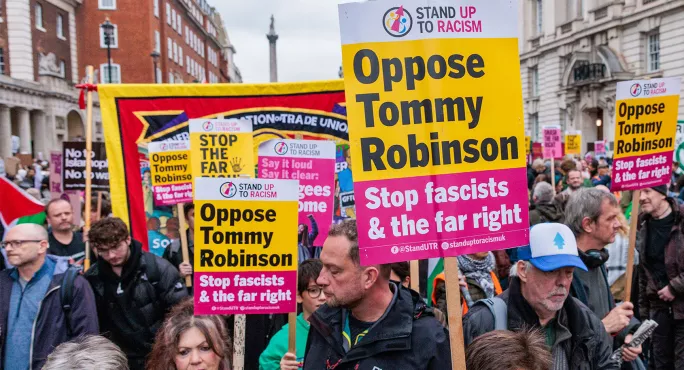What are the rules around teachers attending protests?

Last weekend, thousands took to the streets of central London as part of Tommy Robinson’s “Unite the Kingdom” march and a “Stand Up To Racism” counter-protest supported by the NEU and NASUWT teaching unions.
Teachers were among those present, which raises key questions: can teachers safely join protests without risking their careers? Are their rights to freedom of speech restricted and, if so, why?
Like all citizens, teachers have a right to voice their beliefs. Yet they also shoulder a unique responsibility as role models for young people.
So, how does the law reconcile the tension between the rights of teachers with their responsibilities as educators?
The right to protest
In the UK, the right to protest is protected under Articles 10 and 11 of the European Convention on Human Rights (ECHR), guaranteeing freedom of expression and assembly.
These rights, however, are not absolute but are instead “qualified” for teachers due to the high standards of behaviour expected by the Teachers’ Standards and enforced by the Teaching Regulation Agency (TRA).
Part Two of the Teachers’ Standards states that teachers are required to act with “tolerance and respect” and avoid actions that may undermine “fundamental British values”, including respect for different beliefs and the rule of law.
This means that while teachers legally can protest, they face limitations that other citizens might not.
A balancing act
A member of the public may attend a far-right march, for example, with few professional repercussions. Yet, as educators, teachers must balance their rights with a responsibility to avoid any behaviour that could be perceived as intolerant or divisive within a school community.
- Bridget Phillipson: Teachers may be ‘nervous’ to return to class after riots
- UK riots: Convene ‘urgent’ teacher working group, government told
- Do your pupils understand the consequences of their online actions?
The weight of these expectations became evident in 2016 in a TRA ruling on a religious studies teacher who attended a far-right march and expressed anti-Islamic views. The TRA determined that this conduct compromised the teacher’s ability to fulfil their role, leading to a permanent ban.
The reasoning was clear: public behaviour that reflects intolerance or disrespect for other beliefs is at odds with the duties of a teacher, particularly one teaching religious studies.
Precedents have also been set in the ECHR where judges have ruled that teachers have a duty of and higher expectations of discretion.
Professional impartiality
The conflict between ECHR rights and Teachers’ Standards places teachers in a challenging position.
On one hand, they’re entitled to protest issues important to them - be it environmental issues, education reform or wider global concerns.
On the other hand, the standards they are held to mean their participation in politically charged events could lead to consequences if their conduct risks undermining their professional impartiality or the trust parents place in them.
For instance, political marches can involve contentious slogans or symbolic actions. A teacher’s visible presence at such an event may inadvertently align them with divisive views (even if these are not the views of the teacher), impacting perceptions among parents or pupils.
This is not to suggest that teachers must avoid such events entirely, but they need to consider how publicised involvement could affect their standing in the school community.
Responsible action
The real challenge lies in finding a way to express views responsibly. Teachers need to think through how their attendance at a protest may be interpreted, particularly by pupils and parents, who may see their position as an implicit endorsement of certain viewpoints.
Ultimately, the right to protest remains available to all teachers. However, the reality is that with that right comes with a responsibility to consider the professional implications.
The responsibility extends to social media presence, where photos or comments can be circulated and interpreted in unexpected ways, potentially complicating professional relationships.
Teachers are encouraged to assess their motives for attending a protest, the nature of the event and how their participation may be perceived. A sensible option - prior to taking action - is to seek advice from an organisation such as Edapt or a teaching union, who can help navigate the legal complexities and help avoid policy breaches.
Rightly or wrongly, teachers are always representing the profession, wherever they may be.
Alistair Wood is the chief executive of Edapt
For the latest education news and analysis delivered every weekday morning, sign up for the Tes Daily newsletter
Register with Tes and you can read two free articles every month plus you'll have access to our range of award-winning newsletters.
topics in this article



